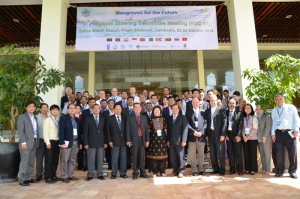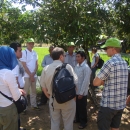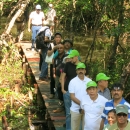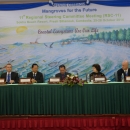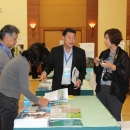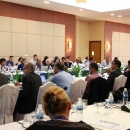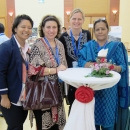Building Coastal Resilience in the Face of Climate Change: RSC-11
Cambodia hosts 11th Mangroves for the Future regional meeting
Location: Sihanoukville, Cambodia. 25th Oct 2014
The meeting is also timely given the official release of the Intergovernmental Panel on Climate Change’s 5th Assessment Report on October 31, which offers sobering predictions around projected sea level rise and increased vulnerability for coastal communities in Asia even if mitigation efforts are increased dramatically.
"Climate change is a reality and the latest report confirms that Asia’s coastlines will be particularly vulnerable. We need to come to grips with the implications of these dangerous trends and introduce effective ways to manage our natural resources, while also allowing for economic growth and securing better lives for coastal communities,” said Dr. Steen Christensen, MFF Coordinator. “The MFF model is making an effective contribution to dealing with these challenges, and we are now focusing on expanding its reach while also sharing the lessons learned."
Started in 2007, MFF works through National Coordinating Bodies in member countries to provide grants for local project delivery and other activities building resilience of ecosystem-dependent coastal communities. While mangroves are the flagship species due to the major contribution they make to maintaining the integrity of coastlines, MFF focuses on all types of coastal ecosystem, including sea grasses and coral reefs.
The initiative is funded by Danida, Norad and Sida and is co-chaired by IUCN and UNDP. The current 10 member countries include Bangladesh, Cambodia, India, Indonesia, Maldives, Pakistan, Seychelles, Sri Lanka, Thailand and Vietnam. At this meeting, Myanmar presented its application and has been officially welcomed as the 11th member country.
Cambodia has been a member of MFF since 2013 and is in the initial stages of launching its coastal projects.
"Cambodia is pleased to be a part of this important regional initiative. Coastal ecosystems play a critical role in supporting the livelihoods of millions of Cambodians, providing important sources of food and income from other coastal products and tourism,” said H.E Dr. Vann Monyneath Deputy Director-General of Technical Affairs of Cambodia’s Ministry of Environment, and Chair of the Cambodia Executive Board for MFF. “In particular, we are glad to have the opportunity to be able to learn from the experience of others as well as to showcase our own efforts on protecting coastal ecosystems to representatives from all over Asia."
Cambodia’s 440 kilometre-long coastline includes significant mangrove forests, coral reefs, sea grass beds and other coastal ecosystems which are vital to the sustainable management of coastal and marine fisheries. MFF small grant projects in Cambodia will focus on Koh Kong and Kampot provinces.
One of the unique features of MFF is the way in which the initiative actively engages all sectors in coastal management including governments, NGOs, local communities and the private sector.
"MFF is interested in working with the private sector to mitigate the impacts that industries in the coastal zone are having on these fragile ecosystems, but also to harness the energy, creativity and entrepreneurial spirit of the private sector in finding sustainable solutions,” said Aban Marker Kabraji, Regional Director IUCN Asia.
During a learning event seminar in the RSC-11 meeting, participants also discussed sustainable financing options for projects that protect the integrity of coastal ecosystems with a focus on community-based ecotourism in Koh Kong province of Cambodia.
About Mangroves for the Future
Mangroves for the Future (MFF) is a partnership-based regional initiative which promotes investment in coastal ecosystem conservation for sustainable development. MFF focuses on the role that healthy, well-managed coastal ecosystems play in building the resilience of ecosystem-dependent coastal communities in Bangladesh, Cambodia, India, Indonesia, Maldives, Pakistan, Seychelles, Sri Lanka, Thailand and Viet Nam. The initiative uses mangroves as a flagship ecosystem, but MFF is inclusive of all types of coastal ecosystem, such as coral reefs, estuaries, lagoons, sandy beaches, sea grasses and wetlands. MFF is co-chaired by IUCN and UNDP, and has been funded over the years by Danida, Norad and Sida.
